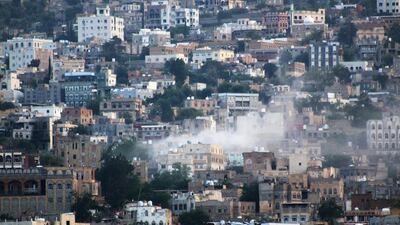ADEN // Houthi rebels in the Yemeni city of Taez have kidnapped dozens of civilians and are holding them in a makeshift prison while they extort money from the detainees’ families.
The rebels seized the south-western provincial capital in March as they swept across the country and drove the internationally-recognised government into exile.
The Iran-backed militia were then beaten back from the country’s south by fighters supporting president Abdrabu Mansur Hadi and the Saudi Arabia-led coalition, but they still hold most of Taez city and have laid siege to the areas not under their control.
Desperate to keep a grip on Taez, in recent months they have increasingly resorted to strong-arm tactics, terrifying the local population and raining shells down on civilian neighbourhoods.
An increasing number of civilians have been hauled into an impromptu detention centre for interrogation. In some cases the Houthis are demanding money for a prisoner’s release.
Hani Al Qadasi, 27, was driving his bus looking for passengers early on 3 October, in the Al Hawban district of Taez city, when two Houthi rebels stopped him at a roundabout.
Instead of the usual checks for weapons, they demanded to see his mobile phone and started searching through his photos until they found an image of Hamoud Al Mikhlafi, the leader of the pro-government popular resistance in Taez.
“They were looking for photos of the resistance in Taez to arrest me under the pretext of supporting the resistance,” Mr Al Qadasi said. “The photos of Al Mikhlafi had come directly from WhatsApp and I am not supporter of any side, I just want to eke out a livelihood.”
The Houthis seized his bus, and took him to some buildings in the north part of the city once used by the former president Ali Abdullah Saleh, who was removed from power in 2011 and has since sided with the rebels.
When he arrived at the area known as “Saleh’s city”, Mr Al Qadasi said the buildings had been converted into a giant prison.
“The Houthis took me out of the car and gave me to the guards, telling them to take me to the department of the supporters,” he said.
While the Houthis did not physically torture him, they put him in solitary confinement and refused to tell him any more about why he had been detained. They confiscated his mobile phone and told him he could not contact his family.
He was handed a piece of bread and a bottle of water — the only food he would receive each day.
On the fifth day of his incarceration, Mr Al Qadasi was told that he was being kept because he was a supporter of the resistance. The same day, he was allowed to call his brother, who came to the prison.
After another two days of Mr Al Qadasi’s brother begging the Houthis for his release, the rebels demanded 200,000 Yemeni Rials (Dh3,400) to free him. He was finally allowed to leave and his bus was returned.
Mr Al Qadasi said three of the buildings were being used to house prisoners. The first contained resistance fighters, the second, anti-Houthi activists, and the third, where he had been kept, was reserved for supporters of the pro-government fighters. While he did not know how many people were being held, he estimated that prisoners were locked up on five floors of each building.
Moa’ath Al Yaseri, a leader of the popular resistance, confirmed that the Houthis are holding dozens of civilians inside the compound.
“Most of the detainees are civilians and we do not know any details about them as the resistance cannot reach the city,” Mr Al Yaseri said.
He stated that as far as he knew, Mr Al Qadasi had no connection with the resistance.
Sami Alawi, a lawyer based in Taez, said the Houthis were committing clear violations of Yemeni and international law by detaining civilians without charge.
“This is a kind of kidnapping,” he said. “The Houthi rebels are not the government and should not be detaining people.”
Both Taez city and the surrounding province have become the main focus of the fighting in the Yemen conflict.
Aid agencies have warned that the Houthi siege on parts of the city has led to an increasingly desperate humanitarian situation. They blame the Houthis for blocking convoys of desperately-needed health aid and food from entering the city.
foreign.desk@thenational.ae

